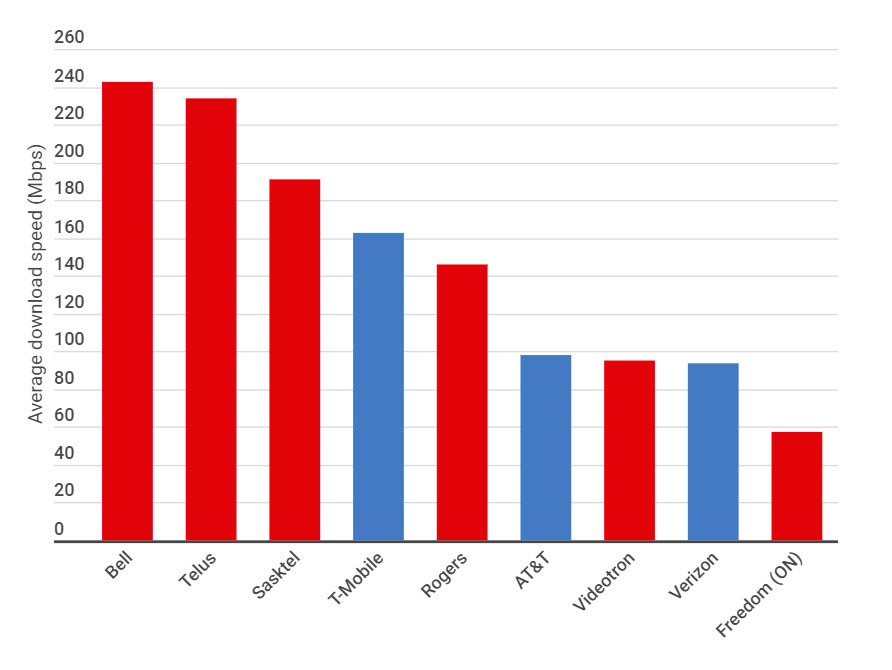
Bell has retained its title as Canada’s fastest mobile network, according to PCMag’s latest report.
To crown Bell as the winner, PCMag drove through more than 40 Canadian cities and towns, as well as rural locations across eight different provinces. What did they find? Something that we already know.
The divide in the performance gap between rural and urban Canada is very prominent. “While urban areas are getting world-class speeds and rock-solid network reliability, rural areas struggle with much lower speeds and less reliable networks,” reads the report.
Download speeds
The top three contenders for the fastest internet were Bell, Telus and Rogers. The report found that Bell’s maximum download speed was 786.8Mbps, up from 760Mbps last year, with an average download speed of 241.8Mbps, also up from last year’s 232.6Mbps speed.
Telus followed with maximum download speeds of 804.4 Mbps, up from last year’s 752.1Mbps speed, and an average of 234.1 Mbps, down from last year’s 239.3Mbps speed.
Rogers’ maximum download speed was 510.2, up from 2020’s 492.4Mbps speed, with an average of 145.8, the same as last year.
Upload speeds
In terms of upload speeds, Bell’s maximum speed was 115.4Mbps, with an average upload speed of 43.2Mbps.
Telus’ maximum upload speed was 116Mbps, with an average speed of 42.6Mbps.
Rogers’ maximum upload speed was 159.4Mbps (best out of the bunch), and its average upload speed was 39.9Mbps.
Latency
Bell’s latency was 25.1ms, Telus’ was 24.8ms and Rogers’ was 28.2ms. Bell’s overall speed score is 100, and Telus followed close with a score of 99. Rogers received a speed score of 84.
Out of the top 20 cities, Bell won in eight, Telus won eight as well, and Rogers won two. Two cities were tied between Bell and Telus, however, Bell’s victory in highly-populated cities like Toronto and Montreal secured it the crown.
The report further states that with an average download speed of 228.4Mbps, Halifax has the fastest download speeds in Canada, whereas London, with an average download speed of 119Mbps across all carriers, has the worst average download speeds. Montreal had the lowest latency, averaging 20.3ms, making it the perfect city for Canadians looking to stream or play multiplayer games, while Toronto had the greatest 5G coverage out of the big three carriers.
PCMag says that speeds stayed steady from 2020 to 2021 even though Canadians are using far more data per month compared to last year. This causes Canadian networks/Airwaves to get congested. But what’s worth noting is that Even when Canada’s networks are congested, they are still faster than those in the United States. Check out the image below for reference:
 However, disparities between urban and rural areas of the same cities are on a rise. Tests done in Moncton, Halifax, Toronto and Regina show that rural areas, in general, have about 150Mbps less speed when compared to urban areas.
However, disparities between urban and rural areas of the same cities are on a rise. Tests done in Moncton, Halifax, Toronto and Regina show that rural areas, in general, have about 150Mbps less speed when compared to urban areas.
For example, the average download speed in urban areas of New Brunswick is 169.1Mbps, whereas, in rural New Brunswick, the average speed drops down to 51.8Mbps. Similarly, in Ontario’s urban areas, download speeds hover around the 260Mbps mark, however, in rural areas, it drops down to 82.6Mbps.
Find a list of best carriers for different provinces below:
| Province | Winning Carrier |
|---|---|
| Alberta | Bell |
| British Columbia | Telus |
| Manitoba | Telus |
| New Brunswick | Bell |
| Nova Scotia | Telus |
| Ontario | Bell |
| Prince Edward Island | Telus |
| Quebec | Bell |
| Saskatchewan | Bell |
PCMag conducted its tests with Samsung Galaxy S21 devices along with non-throttling SIM cards provided by Canadian carriers. Moving forward, PCMag says it will test components like web page downloads, streaming, and voice calling using new software from Solutelia’s WIND solution to form a more comprehensive understanding of the fastest mobile networks in Canada.
Image credit: PCMag
Source: PCMag
MobileSyrup may earn a commission from purchases made via our links, which helps fund the journalism we provide free on our website. These links do not influence our editorial content. Support us here.


